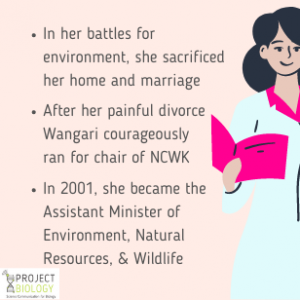Kenyan scholar and activist, Wangari Muta Maathai, is an international figure and Nobel Peace Prize laureate. She continues to be known for forming the Green Belt movement, a massive tree-planting initiative well known across the continents. She is not only the first African woman to receive the Nobel prize, but also the first woman from her country to earn a Ph.D. degree. Furthermore, she was the first-ever female professor her homeland has got. Welcome to an intense life story of fearless Prof. Dr. Wangari Muta Maathai, who waged a war against wrongful doings of her own government.
Early Life
Wangari Maathai was born in a small village at the foothills of Mount Kenya in Nyeri, Kenya to a farming family, in 1940. With no books and toys around, the animals and plants were her only playing props. Such was young Wangari’s closeness to nature that she devoted her entire life to them like a crusader without a cape. As a little girl, Wangari helped her parents in farming until she began going to school.
Education
Upon completion of her schooling as a star student, at 20 years of age, a Young Wangari won the prestigious ‘Airlift Africa’ program, which gave her an opportunity to study in America. She obtained a Bachelor’s degree in biology from Mount St. Scholastica College in Kansas and a Master’s degree in biological science at the University of Pittsburgh in Pennsylvania, which in future, created a memorial on her name as Wangari Maathai Trees and Garden, on its campus to honor her legacy.
She returned to her country and obtained a doctorate degree in veterinary anatomy, in 1971, from the University College of Nairobi. Thus, becoming the first woman to hold a Ph.D. degree in East or Central Africa. She began teaching veterinary anatomy as a professor in the same college. She worked her way up through the academic ranks to be appointed as the chair of the Department of Veterinary Anatomy. Again, she was the first woman professor ever in the region.
A social activist
While working as a professor, Wangari joined various civic organizations and as she worked there, it became evident to her that the root cause of Kenya’s rampant economical and societal problems was environmental degradation. There existed a tyrannical government that made the farmers switch to the cultivation of cash crops like tea and coffee instead of crops for the farmers themselves. There was a shortage of food, and water, even for the livestock. It had ill effects on the lives of the people, particularly women, who were viewed as somebody only to look after the children and household.
Wangari joined the National Council of Women of Kenya or NCWK in 1976. As a member of this council, she aimed to conserve the environment, simultaneously improving the quality of life of poor Kenyan women.
The famous Green belt movement
In 1977, Wangari proposed one solution to all problems in Kenya – tree planting. This gave birth to a cause called “Green Belt” which over time transformed into, internationally acclaimed Green Belt movement. Since then, as a part of this campaign over 50 million trees have been planted, to date across Africa. Not only, it helped revive the environment but provided important skills and opportunities to local women. Hence, giving them a source of income. This resulted in them shunning cruel husbands and village lords.
Due to bringing a change in the country, she found herself at loggerheads with the Kenyan government on many occasions, particularly the then-president. But, she always stood firm against them, who according to her was powerful and misusing their privileges to satiate their greed.
During her active years, Wangari opposed several attempts of the government, to degrade natural forests and parks. Hence, there were numerous instances where she was defamed, persecuted, jailed and physically attacked. One of the first notable clashes was when the Kenyan government decided to strip Nairobi’s Uhuru Park, to construct a multi-story building. Wangari’s campaign received international attention and she became successful in getting the project revoked. This left the government disgruntled. Over her lifetime, she made several powerful enemies, but she continued her future protests against the Kenyan elites.
A tumultuous marriage
During the late 1970s, Wangari’s marital life was shattered when her husband, and father of her three children, Mwangi Mathai, filed for divorce. She was called uncontrollable and strong-minded. Furthermore, he demanded the removal of her forename i.e., Mathai. But she chose to add an extra ‘a’ to it. And that is how it became Maathai from Mathai.
The divorce proved to be a costly affair for her and she struggled to raise her three kids. Finally, she got a work at Economic Commission for Africa which required her to travel extensively throughout Africa. She chose to leave her children with their father. However, she made sure she regularly meets them whenever she could.
Political journey
Shortly after her painful divorce Wangari gathered courage and ran for chairperson of NCWK. Though in initial attempts she lost it but eventually won it. Thereafter, she continued to be elected as their chairperson till 1987.
The year 2002 brought a breeze of change when the Kenyan government was to be passed into the hands of another president. It was the first time that free elections were being conducted in the region. Subsequently, Wangari was elected to Kenya’s parliament with an overwhelming 98% vote. The following year, she was appointed as the Assistant Minister of Environment, Natural Resources, and Wildlife, a post she held till she left the government in 2007.
As a pro-democracy, human rights, and environmental activist she authored several books and scholarly articles. Through these books, she intended to send a message to the world about her country, and the importance of caring about the environment.
International laurels
Wangari received countless international awards and honors for her contributions. Most notably the coveted Nobel Prize in Peace 2004 “for her contribution to sustainable development, democracy and peace”. She was the first environmentalist around the world to receive it.
Other significant awards include the Earth Hall of Fame from Japan in 2010; the Royal Institute of British Architects (RIBA), Honorary Fellowship from the UK in 2008; the Nelson Mandela Award for Health & Human Rights from South Africa in 2007; the Jawaharlal Nehru Award for International Understanding from India in 2007, an appointment to the “Légion d’Honneur by the French government, in 2006; the Order of the Golden Ark Award, from the Netherlands in 1994; the Edinburgh Medal, Medical Research Council from Scotland in 1993.
She served on the boards of numerous eminent organizations like UN Secretary General’s Advisory Boards on Disarmament, Environment Liaison Centre International, and The Jane Goodall Institute, to name a few.
Wangari Muta Maathai received fifteen honorary doctoral degrees from various institutions worldwide. She was also featured in many renowned publications. Though she received numerous accolades internationally, sadly the then-government of her own home country refused to acknowledge her contributions. Instead, they presented numerous blockades throughout her journey.
Death
In 2011, the world lost Wangari to cancer, for which she was taking treatment in a Nairobi Hospital in Kenya. But her remarkable legacy lives on there, as, in 2016, the Kenyan government renamed Forest roads in Nairobi as Wangari Maathai Road to commemorate her contributions to the world. World leaders around the world paid her tribute.
Fondly referred to as Mum or Mom by youngsters of Kenya, Prof. Wangari Muta Maathai was a warrior in a true sense. In an era, where a basic education was a rarity for a woman from rural areas of Kenya, she earned herself a doctorate degree. Even more, she traveled overseas to obtain her education. With an impressive list of “women who pioneered”, she is certainly a role model for women around the globe.
As a woman, she was an outspoken advocate of democracy, human rights, and environmental conservation. During her lifetime, she overcame numerous obstacles, both personally and politically to serve mother nature and her people. Many remain thankful to Wangari Muta Maathai for saving Uhuru Park in Kenya. What a selfless lady, she was! Wasn’t she?



